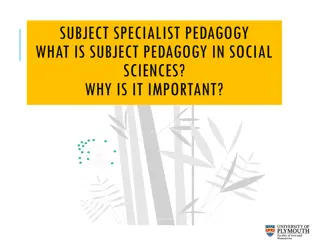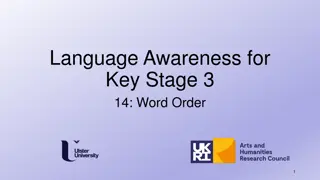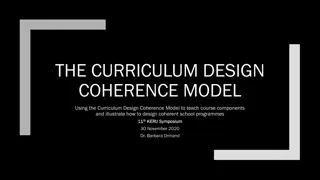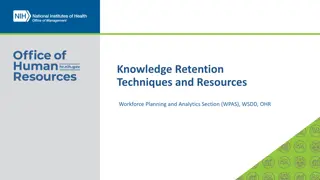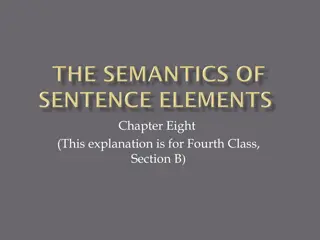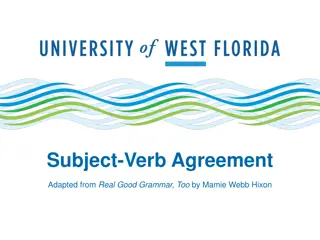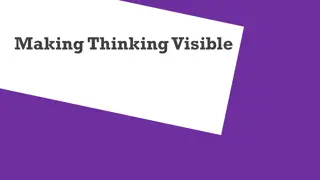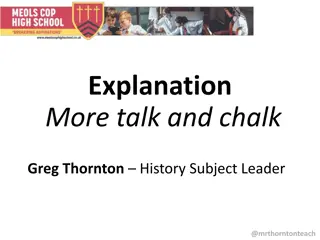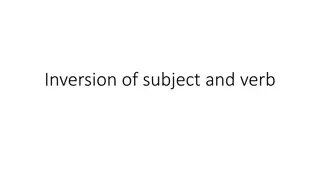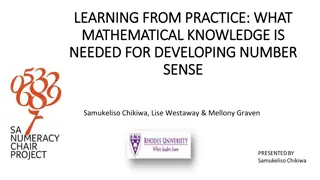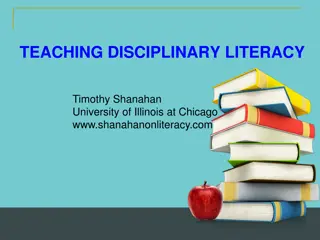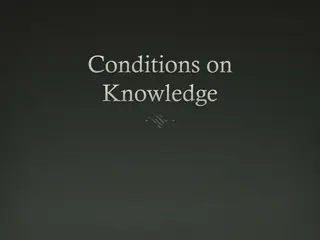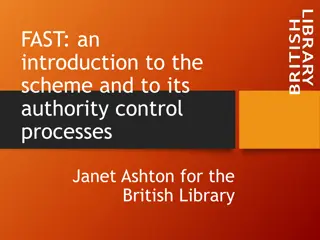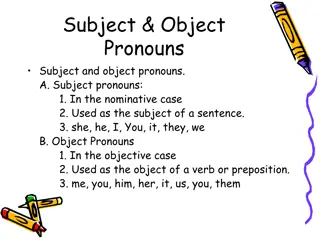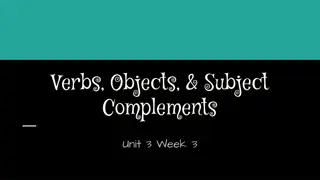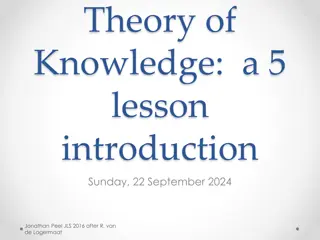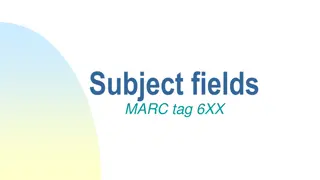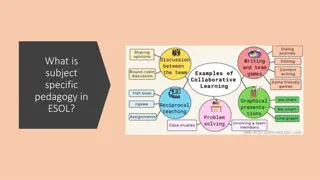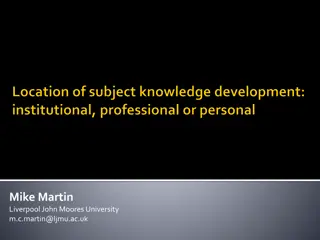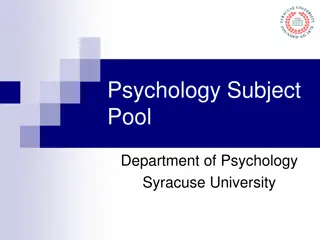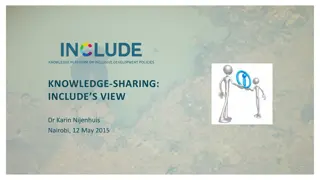Academic Program Choices and Subject Selection Guidelines for High School Students
Explore the academic program options for high school students, including subject selection guidelines, program foci, and required courses. Details on choosing program subjects, available fagpakker (subject packages), and the importance of tverrfaglighet (interdisciplinary learning) are provided. Lea
3 views • 26 slides
Knowledge Capture
Knowledge capture is crucial for organizations to retain valuable expertise and prevent loss of critical knowledge due to employee turnover. Tacit and explicit knowledge play key roles, requiring strategic planning for retention, incentivizing knowledge-sharing culture, and implementing effective st
0 views • 6 slides
Understanding Knowledge Management: Processes and Frameworks 2. In knowledge management, organizations create, share, and manage knowledge to enhance performance. It involves acquiring different types of knowledge through various means, such as perc
Knowledge Management, Organizational Objectives, Types of Knowledge, Tacit Knowledge, Explicit Knowledge
1 views • 17 slides
Explore Economics as a Leaving Certificate Subject
Economics as a Leaving Certificate subject prepares students for diverse career paths in business, finance, and management. The course includes a research project and a structured exam format. With a focus on theory, practical application, and real-world economic concepts, Economics equips students
5 views • 11 slides
Enhancing Social Sciences Teaching Through Subject Specialist Pedagogy
Subject specialist pedagogy in social sciences focuses on effective teaching methods to improve student learning outcomes by deepening understanding and application of subject matter. It emphasizes personalized strategies, active learning, and fostering critical thinking skills. Key elements include
0 views • 10 slides
Understanding Subject-Verb Agreement in English Sentences
Learn about subject-verb agreement in English sentences with singular and plural nouns, first, second, and third person examples, uncountable nouns, and exceptions where plural nouns take singular verbs. Discover how to match the verb form to the subject noun in different scenarios to ensure grammat
2 views • 17 slides
Understanding Word Order in Different Languages
Explore the fascinating world of word order in languages. Discover how different languages arrange words in various ways, such as Subject-Verb-Object (SVO), Subject-Object-Verb (SOV), and more. Delve into the diversity of word orders for subjects, objects, and verbs, and uncover how language structu
2 views • 31 slides
Enhancing Teaching Through Curriculum Design Coherence Model
Explore the use of the Curriculum Design Coherence Model (CDC) for designing effective lectures and guiding pre-service teachers in creating coherent lesson plans. Learn about epistemic progression, systematic ordering of knowledge, types of knowledge, and Bernsteins's knowledge structures to design
0 views • 26 slides
GCSE Subject Choices and Curriculum Information for Key Stage 4
Explore the GCSE subject choices for 2022-2024, compulsory subjects, modern language options, science curriculum details, assessment types, and further subject options for Key Stage 4. Get insights on career implications, A-level choices, and additional subjects to enhance your learning experience.
0 views • 15 slides
Effective Knowledge Retention Strategies in Workforce Planning and Analytics
Retaining knowledge is crucial for organizations to enhance customer service, foster innovation, improve efficiency, and bridge skill gaps. This article explores the significance of knowledge retention, the types of knowledge essential for succession planning, and two effective strategies - the Know
1 views • 10 slides
Understanding Subject-Verb Agreement in English Sentences
Subject-verb agreement is crucial in English grammar to ensure sentences are grammatically correct. The subject of a sentence must agree with the verb in terms of gender, number, person, and case. Incorrect use of verb can lead to ungrammatical sentences. Learn how the subject and verb should match
0 views • 28 slides
Understanding Semantic Roles in Sentence Structure
Semanticists analyze sentences based on semantic structure rather than traditional syntactic terms like subject and object. Instead, they use semantic terms such as Agent, External causer, Instrument, Affected, Recipient, and Locative. These terms help describe how people and things participate in r
1 views • 26 slides
Mastering Subject-Verb Agreement for Clear Communication
Understanding subject-verb agreement is essential for clear and effective communication. Ensure that your subjects and verbs align in number, even when interrupted by phrases. Learn to identify and handle disruptive word groups, and grasp the rules for using "and" and "or" correctly. This guide help
0 views • 20 slides
Understanding Subject Injury Policy and Reporting at OHSU
Explore the subject injury policy, identification process, and reporting guidelines at Oregon Health & Science University (OHSU). Learn how subject injuries are defined, identified, and distinguished from other reactions in research studies. Get insights into determining if an adverse experience qua
0 views • 17 slides
Understanding Making Thinking Visible (MTV) and Its Impact on Learning
Making Thinking Visible (MTV) is a concept that integrates higher-order thinking skills with subject matter learning, aiming to develop students' critical thinking abilities alongside subject knowledge. Rooted in research by Harvard University's Project Zero group, MTV emphasizes sustained thinking
1 views • 20 slides
Understanding Subject Pronouns and Sentence Structure
Learn about the structure of a sentence, the use of subject pronouns to replace subject nouns, and how subject pronouns come before verbs with examples. Subject pronouns like "she," "he," "they," and "we" are essential in forming clear and concise sentences.
0 views • 5 slides
Subject-Object Asymmetries in Zazaki Argument Ellipsis
Many languages allow argument ellipsis (AE), where an argument can be omitted for sloppy or quantificational interpretations. Subject-object asymmetries arise in languages due to subject-verb agreement. This study presents evidence from Zazaki, a Northwestern Iranian language, challenging the anti-a
0 views • 28 slides
Understanding Subject-Verb Agreement in English Grammar
In this multimedia class session, Assistant Head-teacher Uttam Adhikary introduces the concept of subject-verb agreement, emphasizing the importance of matching singular subjects with singular verbs and plural subjects with plural verbs. Through engaging examples and presentations, students will lea
0 views • 41 slides
Enhancing Teacher-Led Instruction through Effective Explanation Strategies
Extensive research highlights the benefits of teacher-led instruction, emphasizing the importance of clear explanations, strong subject knowledge, credibility, concise design, examples & analogy, storytelling, and chances to elaborate. The six keys to great explanation include subject expertise, cre
0 views • 12 slides
Understanding Inversion in English Grammar
Inversion in English grammar refers to the reversal of the usual word order of a subject and a verb in a sentence. This reversal often occurs when starting a sentence with an adverb or adverbial phrase of place, creating a more dramatic effect. Inversion is also seen in direct speech, where the subj
0 views • 11 slides
Understanding Subject Pronouns in English Sentences
Learn about the structure of a sentence and the role of subject pronouns in replacing subject nouns. Subject pronouns come before verbs and help to make sentences clear and concise. Examples provided demonstrate how subject pronouns are used effectively in various sentences.
0 views • 5 slides
Developing Mathematical Knowledge for Teaching in South Africa
Mathematics education in South Africa faces challenges due to insufficient Mathematical Knowledge for Teaching (MKfT) among teachers. Research highlights the need for teachers to possess both subject matter knowledge and pedagogical content knowledge to effectively teach mathematics. Identifying and
0 views • 17 slides
Understanding Disciplinary Literacy: Bridging Across Subject Areas
Disciplinary Literacy distinguishes itself from Content Area Literacy by focusing on specific ways each discipline uses text. It aims to apprentice students into various subject-specific ways of creating, disseminating, and evaluating knowledge. This concept challenges educators to teach subject-spe
0 views • 51 slides
A Guide to Subject-Verb Agreement Basics
Understand the essentials of subject-verb agreement in sentences. Learn how singular subjects match singular verbs and plural subjects pair with plural verbs. Discover key rules, including handling words between the subject and verb, dealing with prepositional phrases, and recognizing subject placem
0 views • 7 slides
Stage 6 Subject Selection Information Evening - June 13, 2017
Explore important details regarding subject selection, eligibility requirements, and the process for HSC and ATAR qualifications. Learn about the courses, assessments, and pathways for students to achieve academic success at RHHS through insightful presentations by school authorities. Understand the
0 views • 23 slides
Exploring Epistemology: Understanding Knowledge and Truth
Epistemology delves into the nature of knowledge, understanding, wisdom, and justification, questioning the extent of human knowledge and the different kinds of knowledge. It explores skepticism and conditions on propositional knowledge, discussing whether knowledge implies truth and the debate betw
1 views • 54 slides
Understanding FAST: A Brief Overview of the Faceted Application of Subject Terminology
FAST (Faceted Application of Subject Terminology) is a subject standard with a controlled vocabulary derived from LCSH and NACO. It provides a faceted vocabulary that is easy to assign and interrogate, making it well-suited for libraries. British Library has adopted FAST as its preferred subject sch
0 views • 19 slides
Navigating the World of Big Data, Knowledge, and Crowdsourcing
The world has evolved into a data-centric landscape where managing massive amounts of data requires the convergence of big data, big knowledge, and big crowd technologies. This transformation necessitates the utilization of domain knowledge, building knowledge bases, and integrating human input thro
1 views • 5 slides
Understanding Subject and Object Pronouns
Learn about subject and object pronouns, their usage in sentences, and examples to differentiate between them. Subject pronouns are used as the subject of a sentence, while object pronouns function as the object of a verb or preposition. Understand when to use pronouns like "I" or "me," "they" or "t
0 views • 13 slides
Understanding Verbs, Objects, and Subject Complements in Grammar
Learn about direct objects, indirect objects, and subject complements in grammar. Direct objects receive the action of the verb, while indirect objects indicate to whom or what the action is done. Subject complements follow linking verbs and describe or identify the subject. Examples and images are
0 views • 5 slides
Exploring the Nature of Knowledge in Theory of Knowledge
Delve into the essence of knowledge with Jonathan Peel's introduction to Theory of Knowledge, pondering on how different disciplines perceive knowledge, the impact of empirical questioning, and timeless wisdom on ignorance and progress. Explore the concept of basic knowledge and its implications, in
0 views • 37 slides
Understanding MARC Subject Headings
Access points in MARC records provide information about what a resource is or what it is about. Commonly used subject headings include personal or family names, corporate body names, conference names, uniform titles, topical subject headings, geographic subject headings, genre or form subject headin
0 views • 21 slides
Understanding ESOL Pedagogy: Subject-Specific Approaches and Principles
ESOL pedagogy involves subject-specific pedagogy, pedagogical knowledge, content knowledge, and sequencing the curriculum. It focuses on making learning topics comprehensible, utilizing students' understandings, and promoting learner autonomy. The underlying principles include activating prior learn
0 views • 11 slides
Understanding Modelling Knowledge and Knowledge Representation
Explore the significance of modelling knowledge through knowledge representation, making it explicit, independent, and reusable. Learn why knowledge representation is essential and how it facilitates exchange, query, inference, and visualization. Delve into examples of knowledge application in vario
0 views • 30 slides
Developing PE Subject Leadership Course Overview
This course aims to enhance subject leadership skills in Physical Education, focusing on leadership development, exploring the role of subject leaders, and improving outcomes for pupils. Participants will reflect on their leadership stage, revisit the core purpose of subject leadership, and develop
0 views • 49 slides
Guidance for Subject Choices: Parents and Students Information Night
Providing essential insights on subject choices for parents and students, this information night covers key areas such as Transition Year, Leaving Certificate options (Applied, Established, and Vocational), subject selection process, potential future implications of subject choices, complementary su
0 views • 25 slides
Understanding Subject-Verb Agreement in Grammar
Explore the importance of subject-verb agreement in sentences, where a singular subject requires a singular verb and a plural subject needs a plural verb. Learn how to match subjects and verbs correctly to maintain agreement. Discover tips, examples, and resources to enhance your grammar skills effe
0 views • 73 slides
Understanding Subject Knowledge Development in Education
Exploring the complexities of subject knowledge development in education, this study delves into areas such as students' existing knowledge, competencies, and the role of institutions in shaping knowledge acquisition. The focus lies on personalizing knowledge to individual needs rather than a fixed
1 views • 22 slides
Understanding the Psychology Department Subject Pool at Syracuse University
The Psychology Department Subject Pool at Syracuse University is a collection of undergraduate students who participate in research to enhance knowledge in psychology. By engaging in experiments, participants gain firsthand experience and contribute to the field while earning course credits. Ethical
0 views • 12 slides
Knowledge Sharing and Inclusive Development Policies
Knowledge Platform on Inclusive Development Policies (INCLUDE) focuses on enhancing research utilization in policy-making to foster more inclusive development. It was established in 2012 with the aim of bridging the gap between research and policy processes in African countries. INCLUDE engages expe
0 views • 8 slides




